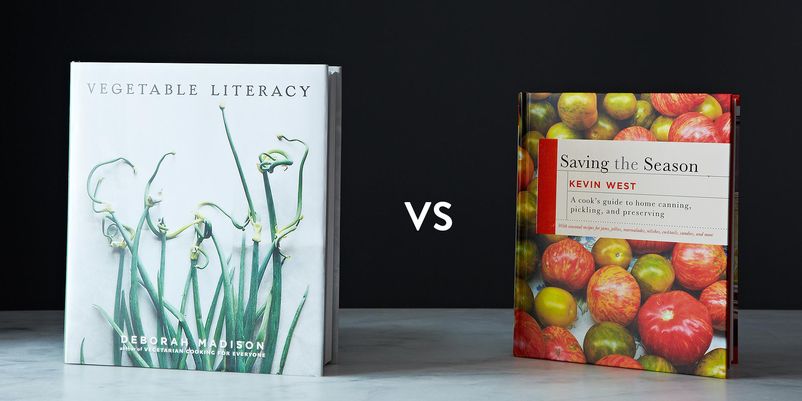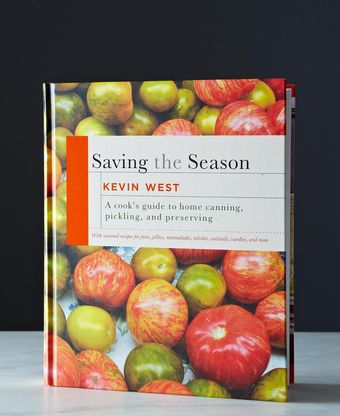Calloo callay! Oh frabjous day! Somehow I managed to score two books that are both highly useful and relevant, and I might have to resort to the medium of interpretive dance to fully explain how rare that is.
Like many food editors, I live at the base of Cookbook Mountain -- a teetering pile of nearly every title that's published every season. While a certain -- unfortunately smallish -- percentage of them are interesting, the intersection of those and ones I'm actually likely to 1) take home and 2) sully in my kitchen is practically microscopic.
I collect cheffity-chef "this is my vision" manifestoes like they're going out of style (though they show no sign of it), but mainly for inspiration. I'm a dedicated home cook, to be sure, but it's not like I have room in my fridge for a hotel pan full of gellan gum and a gallon of duck web stock I was supposed to have made two weeks before. I -- and pretty much any other civilian cook I know -- ain't got time, let alone room, for that, unless it's for a big, special blowout feast.
Here's where Saving the Season and Vegetable Literacy swoop in to save the day. Vegetables and fruit happen. They occur in your home if you are trying to do that whole "not perishing of scurvy" thing, and you might as well have some fun with them. If you're anything like me (and Baal help you if you are), you grew up with an invariable rotation of frozen, canned, or occasionally fresh broccoli, carrots, green beans, corn, tomatoes, and the dreaded leaf spinach just kind of cut up and made hot, possibly tarted up with a pat of butter. Fruit was peeled and cut, or simply chomped, unless its destiny was as the filling of a baked good. Seasonality? BWAHAHAHA!
I made it to adulthood scurvy-free, but ignorant of the possibilities inherent in nature's bounty. In the last 10 years I've probably overcompensated for the lack by becoming one of those pedantic food freaks who grows her own heirloom salsify and epazote and put a provision for weird jarred experiments in her marriage vows (not actually kidding here), but who among us couldn't use a bit more know-how in the vegetable department?
Deborah Madison did a public service by writing Vegetable Literacy. It is, as the title implies, a primer for the crucial business of introducing fresh plant life into your body, and it does so in an incredibly practical, if fittingly academic way. Got a vegetable? Madison has an easy-to-execute method for dispatching it with minimal waste and agita. Every last one of the recipes I tried just worked. The Sautéed Rainbow Chard with the Stems worked. The Tuscan Kale with Anchovy-Garlic Dressing worked, too.
That's not to say they were without fuss and flair -- slicing a pound of Brussels sprouts can prove either meditative or monotonous depending on the kind of day you're having -- but the outcome, especially in Slivered Brussels Sprouts Roasted with Shallots, is inevitably in the bag, and appetizing to boot. Techniques, such as broccoli stem dicing and chard leaf freezing are so simple and obvious as to instantly become canon, and may leave you fretting about all the potentially edible produce you've been tossing out all these years. (Sorry, nature.)
The recipes are divided into family groupings that may seem a bit oblique to begin with, but eventually make sense: carrot, mint, sunflower, knotweed, cabbage, nightshade. Goosefoot and amaranth, (former) lily, cucurbit, grass, legume, and morning glory. Yes, yes, kale gets its due, as does quinoa, sorrel, and all the other fashionable vegetables of our time as well as the greatest hits, but there's also a heavy emphasis on the outliers, like burdock, scorzonera, mandrake, einkorn, and a whole witches' brew of roots and herbs. If it's not in this book, it's not worth eating.
Vegetable Literacy is encyclopedic in its scope -- and sometimes in its tone. Where it's earned its MS in Vegetableology, Saving the Season opted for an MFA in Preservationism.
I didn't grow up with any expectation of pretty prose with my recipes, but I've come to thoroughly appreciate it. It's been a curious and often welcome development over the last while -- cookbooks that function as much as literature as they do instructive texts. It's the utility inverse of all those memoirs with a recipe often awkwardly gummed to the end of each chapter. Kevin West possesses a poet's mastery of language, and uses it to create vignettes that capture the essence of a fruit or vegetable's brief peak season as effectively as his recipes do.
And as with Madison's, the methods -- in this case for pickles, jams, condiments, and other season-prolonging staples -- work. They just do, time and time again, with little hoopla and ideal economy. A simple tip in a grenadine recipe kept my skin and walls un-stained, and while the output was an excellent standalone product (suitable for gift-giving, even), the portion that didn't fit neatly into a pint jar was easily slotted into the onion confiture recipe several pages forward.
But here's the neat trick: said confiture wasn't dependent upon the grenadine component (interdependency is a thing that drives me nuts about so many chef "vision" cookbooks), but rather offered it as an upgrade from a perfectly suitable Cassis. A plum liqueur makes use of apricot kernels left over from, jam, jelly, shrub, and cocktail making.
Those little harmonies loft this book from eccentric to essential, and from my kitchen to my nightstand.
In a different season, the wind may have blown in another direction, but right now, Saving the Season preserves my favor.



78 Comments